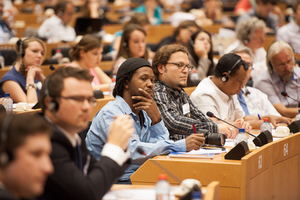Young people have great expectations where the EU decisions makers are concerned, especially after the promises of the 28 EU Heads of States to put together an EU youth employment package. But is this a reliable long term solution to youth unemployment? Young people want the EU to tackle unemployment and education not FOR them but WITH them because they see themselves as the solution to unemployment: through their participation in social life and political decisions which need to be promoted; their personal talents and gifts which can be better discovered through a renewed educational model; their creativity and entrepreneurship which need to be supported.

(Credit: Web)
This is the main message which emerged from the debates which took place among over 350 young participants from different EU countries and the panellists of the Youth Conference hosted by Members of the European Parliament – Patrizia Toia (S&D) and Thomas Mann (EPP) – and co-organised by Konrad-Adenauer-Stiftung, Rete Juventutis, Don Bosco International and COMECE.
• The Economic system is the core problem
For Mgr Omella, the Bishop of Calahorra y La Calzada-Logroño (Spain), youth unemployment is the symptom of a market economy that is not functioning: “A dominant economic system based exclusively on self-driven market which looks for the largest profits, where the speculative prevails over the productive economy; short-term is privileged versus long-term approaches”. Mgr. Omella, reported on the situation of young people in the Spanish labour market and outlined the causes of the current high youth unemployment in his country. “We need a greater commitment to technical and vocational training of young people without at the same time abandoning academic education”, he added. Sarah Prenger, Coordinator of the European Young Christian Workers, described the problems young people are facing in the labour markets and emphasised the consequences of current developments for the planning and management of an individual’s personal life.
• Empowering Young People
In the second panel these ideas were picked up. The discussion centred around how young people could be accompanied and supported. “The point is to create spaces for young people, in which they can put themselves to the test, and develop themselves to the full”, said Lisi Maier from the German Catholic Youth. With regard to increasing mobility, Lothar Harles (Director of the Federation of Catholic Social Formation Centres in Germany) underlined the great importance of international youth work for acquiring intercultural capabilities. Father Giovanni D´Andrea SDB reiterated the idea that education is a “question of heart”, a transmission of values which has to embrace formation and information, skills and values in order to forge men and women to start with, then citizens, thereafter professionals.
Konstantinos Kyranakis, President of the Youth of the European People’s Party (YEPP), emphasized that growth can only be created within a framework that allows young people to enter the labour market through the use of their own abilities. Only that would spark entrepreneurship and ensure the empowerment of the young generation.
• The importance of non-formal education
Youth work is a crucial aspect of education. During the conference the role that education and training can play in addressing the crisis in Europe and, furthermore, the important part which it plays in the personal development of an individual were pointed out. In addition to overcoming the economic crisis in Europe by the means of education and training initiatives, youth work can make a significant contribution towards offsetting the social impacts of the crisis. By empowering young people to become active citizens, the stability of political systems will be safeguarded in the long run.
The organisers of the conference call on all decision makers, on national and EU level, to listen to and involve young people when elaborating policies. They invited all young Europeans to take action, launch initiatives and make their voice, concerns and ideas heard, especially endorsing their power as citizens in view of the upcoming EU Parliamentary elections in May 2014.
